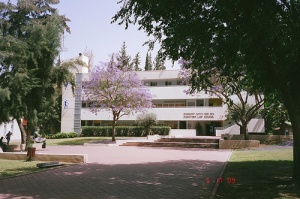Difference between revisions of "Interdisciplinary Center Herzliya"
(→Funding) |
(→Funding) |
||
| Line 30: | Line 30: | ||
==Funding== | ==Funding== | ||
IDC is entirely privately funded. It has an operational budget (which pays for teaching and administration etc) supported by tuition fees and a development budget which pays for buildings and facilities. The tuition fees are significantly higher than Israel’s public universities. According to an article in ''The Chronicle of Higher Education'', IDC charges $9,000 annually for tuition, compared with $2,000 at most public universities. <ref>Matthew Kalman, ‘[http://matthewkalman.blogspot.com/2009/03/israels-interdisciplinary-center-draws.html Israel's Interdisciplinary Center Draws Praise for Its International Outlook]’, ''The Chronicle of Higher Educatio''n, Vol. 55 No. 28, p.27, 20 March 2009</ref> The development budget, according to that 2009 article, is around $12-million. The article claims that 70 per cent of that comes from Israelis. <ref>Matthew Kalman, ‘[http://matthewkalman.blogspot.com/2009/03/israels-interdisciplinary-center-draws.html Israel's Interdisciplinary Center Draws Praise for Its International Outlook]’, ''The Chronicle of Higher Education'', Vol. 55 No. 28, p.27, 20 March 2009</ref> | IDC is entirely privately funded. It has an operational budget (which pays for teaching and administration etc) supported by tuition fees and a development budget which pays for buildings and facilities. The tuition fees are significantly higher than Israel’s public universities. According to an article in ''The Chronicle of Higher Education'', IDC charges $9,000 annually for tuition, compared with $2,000 at most public universities. <ref>Matthew Kalman, ‘[http://matthewkalman.blogspot.com/2009/03/israels-interdisciplinary-center-draws.html Israel's Interdisciplinary Center Draws Praise for Its International Outlook]’, ''The Chronicle of Higher Educatio''n, Vol. 55 No. 28, p.27, 20 March 2009</ref> The development budget, according to that 2009 article, is around $12-million. The article claims that 70 per cent of that comes from Israelis. <ref>Matthew Kalman, ‘[http://matthewkalman.blogspot.com/2009/03/israels-interdisciplinary-center-draws.html Israel's Interdisciplinary Center Draws Praise for Its International Outlook]’, ''The Chronicle of Higher Education'', Vol. 55 No. 28, p.27, 20 March 2009</ref> | ||
| + | |||
| + | ==Israeli Funds== | ||
| + | |||
| + | ==Foreign Funds== | ||
| + | IDC has set up a network of foreign fundraising groups. The most important of these is the American organisation [[American Friends of the IDC]], but there are also similar organisations in the UK, Germany and Hong Kong. | ||
==External links== | ==External links== | ||
Revision as of 15:09, 28 July 2009
The Interdisciplinary Center (IDC) is a private (non-profit) college located in Herzliya, Israel. The languages of instruction in the Interdisciplinary Center are Hebrew and English. It has strong connections with the military and intelligence in Israel. The college hosts the annual Herzliya Conference which has taken place every year since 2001[1].
Contents
History
Founded in 1994 by Professor Uriel Reichman, the Interdisciplinary Center is Israel's first private college. The IDC provides an interdisciplinary education, which combines academic study with practical training.
Schools and research institutes
As of 2007, its student population consists of 3,000 undergraduate students and 1,200 graduate students, enrolled at IDC's six schools:
- Radzyner School of Law
- Arison School of Business
- Efi Arazi School of Computer Science
- Lauder School of Government, Diplomacy and Strategy
- Sammy Ofer School of Communications
- The New School of Psychology
- Raphael Recanati International School (RRIS) - As of 2008, 850 students from 56 countries are studying full-degree programs in English. The Interdisciplinary Center is currently the only Israeli institute in which one can complete a B.A. and an M.A. studied solely in English.
IDC's research institutes include the:
- Institute for Policy and Strategy (IPS), which organizes the "Herzliya Conference" every year
- International Policy Institute for Counter-Terrorism (ICT)
- Caesarea Edmond Benjamin de Rothschild Center for Capital Markets and Risk Management
- Global Research in International Affairs Center (GLORIA)
- Center for European Studies
- Project for the Research of Islamist Movements
Notable faculty
Prof. Uzi Arad (Former Director of Intelligence at the Mossad; Advisor to Israeli Prime Minister Netanyahu) | Prof. Aharon Barak (Former President of the Israeli Supreme Court) | Prof. Shlomo Ben-Ami(Former Minister of Foreign Affairs, National Security)| Dr. Isaac Berzin (Founder of GreenFuel Technologies Corporation, named to Time 100 Most Influential List) | Dr. Keren Eyal (Researcher on Sex & Socialization subjects, currently lecturing Propaganda lessons) | Dr. Boaz Ganor (Executive Director of the International Policy Institute for Counter-Terrorism [ICT]) | Dr. Oded Oran (Former Ambassador to both Jordan and the European Union) | Amb. Avi Primor (Former ambassador to Germany, Belgium and the European Union) | Prof. Amnon Rubinstein (Former Minister of Communications, Education) | Prof. Shimon Schocken | Prof. Gadi Taubenfeled
Funding
IDC is entirely privately funded. It has an operational budget (which pays for teaching and administration etc) supported by tuition fees and a development budget which pays for buildings and facilities. The tuition fees are significantly higher than Israel’s public universities. According to an article in The Chronicle of Higher Education, IDC charges $9,000 annually for tuition, compared with $2,000 at most public universities. [2] The development budget, according to that 2009 article, is around $12-million. The article claims that 70 per cent of that comes from Israelis. [3]
Israeli Funds
Foreign Funds
IDC has set up a network of foreign fundraising groups. The most important of these is the American organisation American Friends of the IDC, but there are also similar organisations in the UK, Germany and Hong Kong.
External links
Notes
- ↑ Previous Conferences, Herzliya Conference Series, Herzliya Conference, Accessed 23-July-2009
- ↑ Matthew Kalman, ‘Israel's Interdisciplinary Center Draws Praise for Its International Outlook’, The Chronicle of Higher Education, Vol. 55 No. 28, p.27, 20 March 2009
- ↑ Matthew Kalman, ‘Israel's Interdisciplinary Center Draws Praise for Its International Outlook’, The Chronicle of Higher Education, Vol. 55 No. 28, p.27, 20 March 2009
